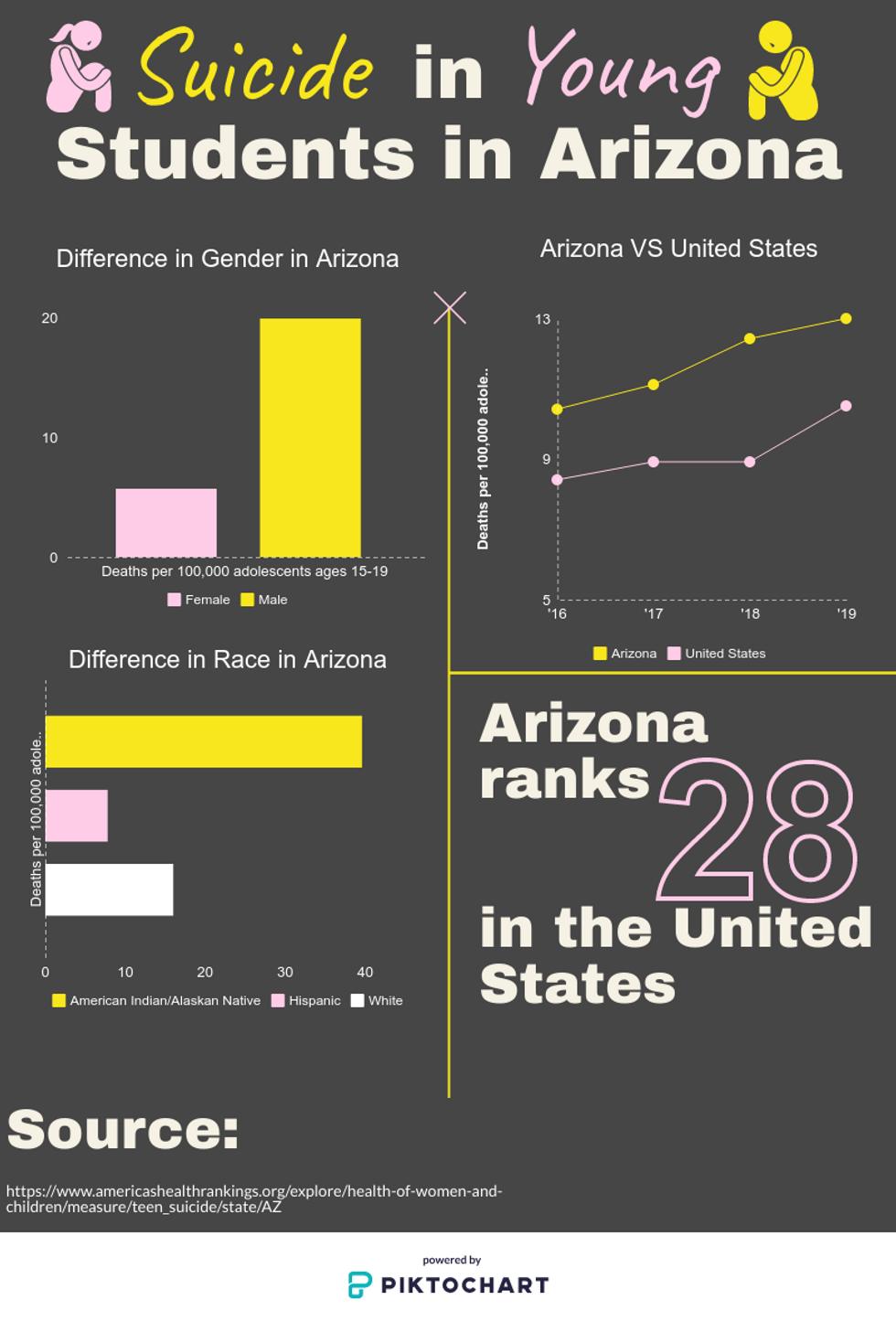After a surging increase in teen suicides, multiple prevention programs have been created throughout the Valley to try to counteract the rise from 10.4 deaths by suicide per 100,000 adolescents ages 15-19 to 13.0 per 100,000.
In the past 15 months, there have been 31 teen suicides in the East Valley alone. In the past year, Teen Lifeline, a service that helps teens over the phone if they need support, received over 23,000 calls from teenagers and younger. The steep increase has motivated communities, schools and parents to create programs where students are allowed to receive help with how they are feeling, as well as informing adults about the signs of depression in teens.
The Gilbert Unified School District provides school social workers, nurses and psychologists with suicide prevention skills and who understand the signs of depression. The district also shows a video to students explaining how they can help themselves or others who might be suffering from feelings of depression and anxiety.
Anthony Neff, a student at Desert Ridge High School in Gilbert, took his own life in September.
The suicide of Desert Ridge High School student Anthony Neff in September pushed school administrators to make an effort to stop the trend of increasing suicides.
Neff's mother, Debbie Neff, said through an email to ABC15, "I appreciate what you are doing, and pray your article somehow touches a young person's life in such a distinct way to prevent them from making the same type of choice."
Maia Rogers, a junior at Desert Ridge, said the SOS video made her "more aware of how my peers are feeling and if needed how to help them. Overall I have been trying to spread more positivity and bring light to this topic."
Combs High School in Gilbert also does a presentation about the signs of suicide and counselors are available for students afterward as a form of intervention, said Chris Farabee, Combs High School principal.
The suicide prevention programs are becoming more accessible to teenagers and are positively impacting the community, according to Karen Coppinger, a 49-year-old caseworker for ComCare with a bachelor's in psychology. ComCare is a behavioral health organization based in Tempe that provides advocacy and education, to strengthen community partnerships, and to strive for measurable excellence, according to its website.
"If the teen was given an easy number, some of them have numbers that they can remember to call. I don't think it's a bad idea, and I think it can definitely help there. It must be helping and they're popping up more and more. So I do think that it is benefiting teenagers," Coppinger said.
More should be done for teenagers that make them more social outside of technology and become more actively engaged with their peers, Coppinger said.
"I think there could be even bigger things we could do. I think teams need more activities going on in the community specifically for teens, not for children, but for the age group of high school and college. They avoid taking that age group, but there's just a lack of things for that age to do socially," she said.
Coppinger said she believes that the cause for teens to become more depressed is the reduced amount of physical activity in our daily lives, largely because of technology, mobile devices and social media.
"I don't think we're getting outside enough and breathing fresh air like we all used to do," Coppinger said. "We're not active as much, so we're sitting on their phones, so we're sitting down somewhere. We're just not moving as much."
Needs a better transition here before you jump into another thought about social media's impact. You don't connect any of the dots between teen suicide and social media. There's a huge gap in the cause and effect.
Additionally, social media is based on physical appearance and skewed perceptions that teenagers are basing their connections on, according to Coppinger.
"The way it's set up to be based on your physical appearance and how many likes or dislikes you get. People are basing their friendships based on a false reality of who is looking at your page and liking your posts at the time," Coppinger said. "The teen years, that is where their brains have not developed fully yet. They base so much of their self-esteem on peer approval and how they appear to their friends and they're basing it on a false reality of numbers of likes and it's just not reality."
















